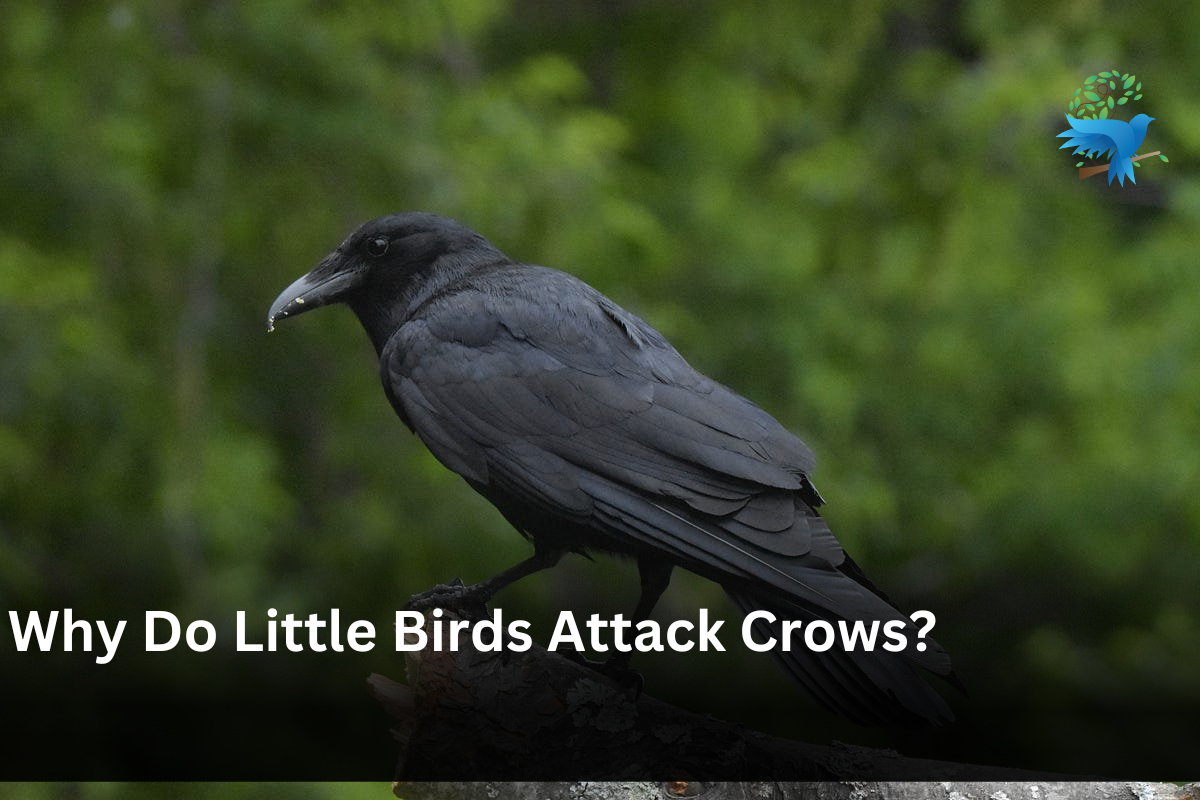Why Do Little Birds Attack Crows?

Birds are fascinating creatures known for their beautiful plumage, melodic songs, and their flying ability. However, a curious phenomenon captures the attention of nature enthusiasts – little birds attacking crows.
In this blog post, we will explore the reasons behind these intriguing interactions and shed light on why some smaller birds engage in collective aggression against larger predators like crows. We will delve into
The concept of mobbing behaviour and how it plays a vital role in protecting territory, resources, and offspring.
Understanding the Background
Before we dive into the motivations behind little birds attacking crows, it’s essential to understand the particular bird species involved in these conflicts.
Red-winged blackbirds are known for their boldness when confronting larger species, such as crows or bald eagles. Red-winged blackbirds exhibit aggressive behaviours toward intruders during breeding season or when defending their nests against potential threats.
Factors Contributing to Bird-Crow Conflicts
Competition for Resources
Crows have established themselves as notorious scavengers able to steal food from other birds’ territories.
This creates intense competition for limited resources among feathered inhabitants of ecosystems where both crows and smaller birds dwell.
Nest Defense
One significant reason why do little birds attack crows is nest defense. Crows have gained a reputation as nest predators due to their size advantage over many smaller bird species.
In response to this threat, tiny avian defenders deploy tactics like mobbing behaviour to safeguard their eggs or chicks from predation by larger predators.
Red-winged blackbirds are famous for their boldness in defending their territories from intruders, including crows.
During the breeding season, male red-winged blackbirds exhibit aggressive behaviour by dive-bombing and chasing away trespassing crows that threaten their nests or fledglings. They emit loud alarm calls while performing aerial manoeuvres to disorient the crow.
Bird Strategies to Attack Crows
Mobbing Behavior
Mobbing is a remarkable phenomenon observed across various bird species where they unite as a group collectively to repel predators.
When a crow trespasses into their territory or poses a threat, little birds will sound the alarm by vocalizing loudly, attracting more members of their species to join the mob. The sheer number and collective aggression overwhelm the crow, forcing it to flee.
Some species, like sparrows, form tight-knit communities when confronted with larger predators like crows.
These groups work together using cooperative defence strategies against threats by mobbing the intruder relentlessly until it retreats or leaves their territory entirely.
Barn Swallows show an excellent example of mobbing. In the face of potential threats to their nest, a vigilant pair of swallows promptly emits a warning call. In response, a nearby swallows swiftly converges, uniting their efforts to effectively deter any intruders that encroach upon their domain.
Vocalization and Distraction
Little birds employ a combination of warning calls and distraction techniques when mobbing crows.
They emit loud alarm calls that not only inform nearby birds about the intruder but also serve as warnings for other animals in the vicinity.
Additionally, smaller birds may perform aerial acrobatics or swoop down at the predator to give an illusion of multiple attacks, disorienting and overwhelming the crow’s defences.
Physical Intimidation
While small compared to crows, little bird species are quick and agile with sharp beaks capable of delivering swift pecks to vulnerable areas such as heads or backs.
This physical intimidation can cause enough discomfort for crows to retreat quickly from these aggressive encounters.
Read More: Are Blue Jays Aggressive Birds? Truth About Their Aggression >>>
Potential Reasons for Little Birds’ Aggression
Protection of Offspring
Breeding season is a critical time for many bird species, where they invest substantial energy into raising their young.
Smaller birds realize that crows pose a significant danger to their offspring due to nest predation tendencies.
Consequently, attacking crows becomes an instinctual response to defend nestlings or eggs from potential harm.
Protecting Territory and Resources
Securing sufficient food sources is essential for survival throughout all phases of a bird’s life cycle—occupying territories with ample resources crucially determines reproductive success among avian communities.
By driving away predators like crows from food-rich areas through mobbing behaviour, small birds ensure bountiful provisions for themselves and future generations.
The captivating sights of little birds fearlessly attacking larger predators like crows demonstrate nature’s intricate dynamics.
Through mobbing behaviour, bird species such as red-winged blackbirds effectively protect their nests, young ones, and valuable resources from potential threats.
Frequently Asked Question
Why do little birds attack crows?
Little birds attack crows to protect their nests, offspring, and resources from larger predators through mobbing behavior.
How do little birds attack crows?
Little birds use vocalization, distraction techniques, and physical intimidation to overwhelm and drive away crows.
What is mobbing behavior in birds?
Mobbing behavior is when birds unite as a group to collectively repel predators like crows using aggression and numbers.
Which bird species attack crows?
Red-winged blackbirds, Sparrow are known for attacking crows during breeding season to defend their nests and fledglings.
Why are little birds aggressive toward crows?
Little birds are aggressive towards crows to protect their offspring from nest predation and secure valuable resources for survival.


